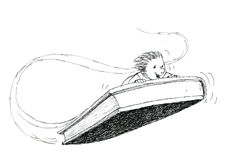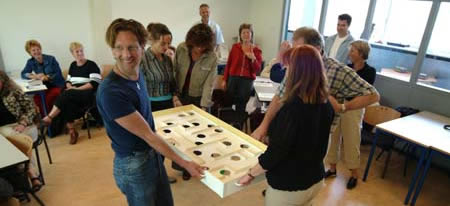5 |
Choose a concept that attracts good teachers |
From vision to concept |
| |
| |
| |
| A matter of magic |
|
|
 |
|
|
| |
“It was great fun because the parent volunteer also read to us a page from ‘The Goblet of Fire’ of Harry Potter,” Harris was telling excitedly when he entered the classroom. He did not leave so enthusiastically, I thought. “And what do you want to do now?”
I asked. |
| |
|
| |
|
| Harris came to our school as a kid. He fled with his parents from Bosnia. In the beginning he had to get used to all the new children. He had spent the last years for a major part in an air-raid shelter. But Harris became acclimatized, got friends and developed. But learning the Dutch language ‘with understanding’ proved to be a difficult task. But he did want to do it. The teacher and some parent volunteers helped him. Harris has just become nine years old and he reads at level Avi 6. |
| |
“I don’t know,” he said.
“Would you like to read in Harry Potter yourself?” I suggested.
“But it is more than Avi 9.”
“But it is not forbidden!”
Harris ran out of the class and Lex ran after him.
“How long may I read?” he asks with ‘The Goblet of Fire’ proudly in his hands.
“Until you don’t want it anymore.”
“Don’t I have to do arithmetic today?”
“As long as you are reading, you don’t have to do anything else. It seems these things cannot be combined.” |
| |
| Halfway the afternoon Harris has read nineteen pages and Lex twelve. The whole class knew that before school was out. From the next day also other children are caught by the Potter-rage. Avi – I do not – know - how many becomes dreaming away in a world that does not exist. |
| |
| I read in the logbook of the parent volunteers before Potter: “He does not understand what he is reading, he messes things up, has disturbed the whole lot with corny giggling, he must start on page 25 and not on page 29 as he is going to maintain.” In that same logbook after Potter it can be read: “He is very zealous, he is difficult, but still madly enthusiastic, he reads neatly and beautifully, his attitude is perfect, it is a pleasure reading with him. ” The testers will find it hard to explain: for the teachers from the Experience Oriented Education it will be somewhat easier and Potter… well he can really do magic! |
| |
In your class there are a future policeman,
stamp collector, businessman, water-polo player, politician,
soldier, actor, tree surgeon, scientist, autodidact,
world traveller, baseball coach, ornithologist and unlucky person.
How do you prepare them all well for a happy future?
|
| |
| |
| Proof against ‘bad weather’ |
| |
In many schools people talk about vision in order to formulate one’s own criteria and starting points. Those self devised documents are (in the most favourable case) regularly discussed and adjusted if necessary. So the teams take ‘of all concepts the best’ and ‘only starting points that fit their own situation.’
But how much time does a team invest in the formulation and what is the output? What do you do with these discussion papers when after a while a number of teachers have been replaced? Are the self devised criteria also proof against unrest and crisis? |
| |
| The finally stated goals are generally determined by subjective criteria: the phase in which the school is, the relationships within the teams (who are doing the talking?), the moment on which the vision meeting takes place (just before or after a holiday) et cetera. Besides in noncommittal situations the well-known container terms are frequently used. If the starting points must be made concrete one leaves the big terminology and the ’real fight’ starts. Then everybody has to defend his own interests and relationships play a crucial role. Of course ways of working must be based on the starting points the team agrees upon. But that process is not accelerated by one’s own formulations alone. There are a number of worked out concepts which are worth studying. |
| |
Vision
A vision is the way in which one judges matters, considers matters.<>
In vision discussions people say what they think about matters.
Vision changes depending on mood and relationship.
|
Concept
A concept is a draft, a provisional formulation.
In concept discussions it is considered what the consequences will be.
Concepts are consistent even if the circumstances change.
|
| |
The advantage of a concept (contrary to a vision) is that you can communicate to third persons very well about your starting points. A concept is also proof against ‘bad weather.’ That does not mean problems are solved but it is clear how to tackle them. Especially in periods when it comes to it, it is really important that everybody knows what to stick to and what he may expect from others.
Processes, certainly if you are an active part of them yourself, are so complex that you cannot speak easily about them. That is why it is so much the better to have clear criteria to stand up to the complexity. This is certainly important in periods when you would be inclined to fall into old and regressive behaviour. |
| |
 |
| |
| |
| Vision and biography |
| |
Uncle Pete told me that he slept with seven brothers in one room in the past
(about 60 years ago). His father did not come upstairs very often, but if he did come it was serious. “And in those days there was no distinction. When he came… everybody got a slap. In that way he once beat me so I awoke” according to uncle Pete.
|
| |
There is nothing so unfair as treating everybody in the same way. |
| |
| Your vision inspired by an image of the time and cultural influences, determines your acting. For that reason in the process form vision forming to concept choice the crucial questions present themselves: How do you think people are developing and what are the consequences for education? |
| |
In relationship to those two insights the biographies of all those involved can be discussed. What kind of education did you have yourself? What did you learn and how? What are your own educational frustrations and how can you prevent them for others?
If teachers and students from the teachers training college have an image of the ‘ideal teacher’, inspired by their own biography. That image is formed by sometimes a few profound experiences. |
| |
| By making those images explicit one can get insight into the obstacles to realize that ideal. When the ideal image and the obstacles are clear, there are challenges. Challenges to work at in a fixed way. That means that the teacher and the student at the teachers training college can counsel children as they are developing: connected to what you already can do and know, the image in mind where you want to go to with interventions which the pupil and his counsellor both ‘understand’. |
| |
It gives the social worker a good feeling when he has found a solution for the other.
It gives the coach a good feeling if he has been able to have the other one find the solution himself.
|
| |
| |
| |
| |
| |
|
|

